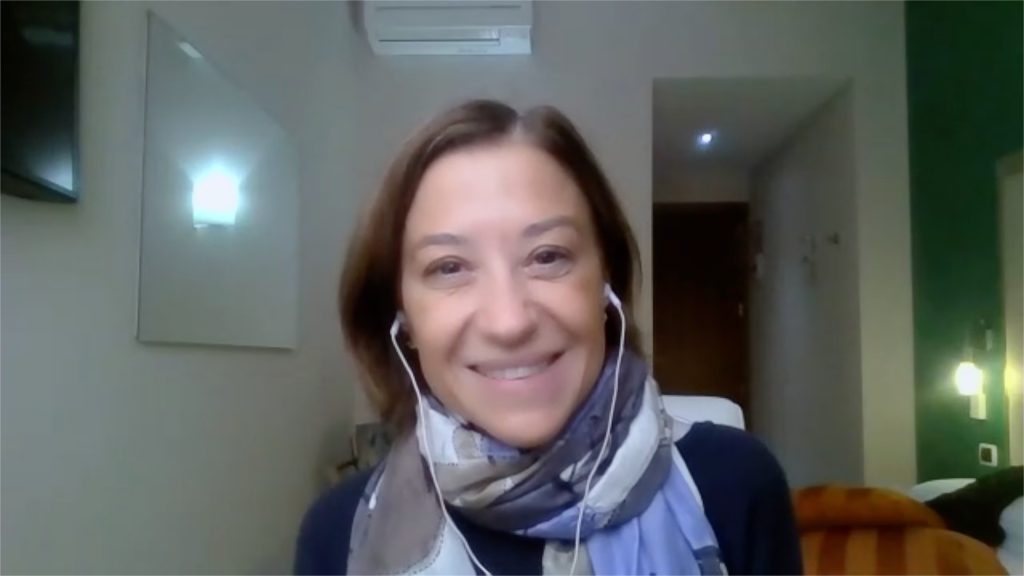touchONCOLOGY coverage of data presented at ASCO 2024:
To further understand the key developments and research presented in the field of gynaecological oncology at ASCO 2024, we spoke with Dr Domenica Lorusso, Professor of Obstetrics and Gynaecology at Humanitas University of Milan, Italy.
In this interview, Dr Lorusso discusses the findings from the BrUOG 354 (NCT03355976), AGO-OVAR 2.29/ENGOT-ov34 (NCT03353831), KEYVIBE-005 (NCT05007106) and CARACO (NCT01218490) trials, offering her valuable insights into the impact the results could have on clinical practice.
Associated abstracts:
Dizon DS, et al. Final results of BrUOG 354: A randomized phase II trial of nivolumab alone or in combination with ipilimumab for people with ovarian and other extra-renal clear cell carcinomas. ASCO Congress 2024, Abstract LBA5500
Marmé F, et al. Atezolizumab versus placebo in combination with bevacizumab and non-platinum-based chemotherapy in recurrent ovarian cancer: Final overall and progression-free survival results from the AGO-OVAR 2.29/ENGOT-ov34 study. ASCO Congress 2024, Abstract LBA5501
Rojas C, et al. Vibostolimab coformulated with pembrolizumab (vibo/pembro) for previously treated advanced mismatch repair–deficient (dMMR) endometrial cancer: Results from cohort B1 of the phase 2 KEYVIBE-005 study. ASCO Congress 2024, Abstract 5502
Jhingran A, et al. Adjuvant chemotherapy following concurrent chemoradiation (CRT) in patients with high-risk early-stage cervical carcinoma following radical hysterectomy: Results of NRG oncology/RTOG 0724/GOG-0724. ASCO Congress 2024, Abstract 5504
Classe JM, et al. Omission of lymphadenectomy in patients with advanced epithelial ovarian cancer treated with primary or interval cytoreductive surgery after neoadjuvant chemotherapy: The CARACO phase III randomized trial. ASCO Congress 2024, Abstract LBA5505
Disclosures: Domenica Lorusso has served as a consultant for Novartis and MSD; received grant/research support from AstraZeneca, Clovis Oncology, Pharma&, Genmab, GSK, MSD, Immunogen, Incyte, Novartis, Pharmamar, Roche, Seagen, Alkermes and Corcept; participated in advisory boards for AstraZeneca, Clovis Oncology, Daiichi Sankyo, Genmab, GSK, Immunogen, MSD, Novartis, Oncoinvest, Novocure, Seagen and Sutro; and been a speaker’s bureau participant for AstraZeneca, Clovis Oncology, Daiichi Sankyo, Genmab, GSK, Immunogen, MSD, Novartis, Oncoinvest, Novocure, Seagen and Sutro.
This content has been developed independently by Touch Medical Media for touchONCOLOGY and is not affiliated with ASCO. Unapproved products or unapproved uses of approved products may be discussed by the faculty; these situations may reflect the approval status in one or more jurisdictions. No endorsement of unapproved products or unapproved uses is either made or implied by mention of these products or uses by Touch Medical Media or any sponsor. Views expressed are the speaker’s own and do not necessarily reflect the views of Touch Medical Media.
Click here for more content on gynaecological cancers & for further ASCO 2024 highlights visit here.
Transcript
Good morning. I’m Domenica Lorusso, full professor of obstetrics and gynecology at Humanitas University of Milan, and, we are here to discuss the latest news coming from ASCO in terms of gynecological malignancies.
At ASCO, we received the results of a very important randomized phase II trial, the BrUOG 354, reporting the comparison between nivolumab alone or in combination with ipilimumab in the gynecological tumor clear cell carcinoma. And the trial was a confirmation that the combination of ipilimumab plus the nivolumab was better than the nivolumab alone in terms of overall response rate, which was the primary endpoint, 14% versus 31%. But also progression free and overall survival. The results of immunotherapy in ovarian cancer are generally scanty, but the clear cell tumor confirms to be the only histology that respond to immunotherapy and to combined immunotherapy in particular.
In terms of immunotherapy, we have also the results of AGO-OVAR 2.29/ENGOT-ov34 study, no platinum-based chemotherapy in recurrent ovarian cancer patient not suitable for platinum pretreatment.
Unfortunately, this trial was negative and the did not report to increase progression free and overall survival with respect to bevacizumab alone or in combination with chemotherapy in platinum resistant ovarian cancer. Subgroup analysis suggest that maybe a benefit can be seen in patient treated with weak lipaglitaxel, but it was only an exploratory analysis.
It seems to be interesting, the combination of vibostolimab plus pembrolizumab in a patient with the mismatch repair deficient endometrial cancer. The combination seems to increase the overall response rate with respect to historical data with the chemotherapy alone, but it’s very, very very preliminary data of the court B1 of the phase II KEYVIBE-005 study. So quite early to draw definitive conclusion.
It was very interesting to see the results of a trial by waiting for the longer term effect of the hormonal treatment in patient with the beta cancer designated to, conservative strategy.
The trial compared, according to a national registry, treatment with hormones versus hysterectomy in a patient with infertility.
It was interesting because even though retrospective, but but the data are quite interesting. At the two here, there is no difference between the hormonal therapy and hysterectomy, but that the longer follow-up of patients receiving oral therapy and the worst overall survival, thus confirming that hormonal therapy is not an alternative to hysterectomy, but simply a strategy to preserve fertility, phenylized to fertility itself, not to cure the cancer.
Also interesting, the results of CARACO trial. This was a randomized phase III evaluating the rule of lymphadenectomy at the time of interval cytoreductive surgery in patients with advanced ovarian cancer. The trial confirmed the results of the LION trial and clearly reported that there is no benefit in patient with stage 3 and 4a ovarian cancer receiving a lymphadenectomy at primary surgery, but also at the time of interwoven divergent surgery. No difference in terms of progression free survival and overall survival. Thus, suggesting that in the absence of a bulkier lymph node, lymphadenectomy should not be performed in ovarian cancer.
Confirmatory data also from the RTOG 0724/GOG- 0724, a randomized trial evaluating the rule of adjuvant chemotherapy following concurrent chemoradiation in patient with, high risk early stage cervical cancer following radical hysterectomy.
This trial clearly reported that there is no benefit in adding HADI one chemotherapy after, concurrent chemoradiation.
And, I I think this where confirmatory trial verified even that there is no rule for this strategy.
And, that’s all from ASCO.
Thank you so much for your attention.
Interviewer/Editor: Carla Junkier
Cite: Lorusso D. Key insights in gynecological malignancies: BrUOG 354, AGO-OVAR 2.29/ENGOT-ov34, KEYVIBE-005, CARACO. touchONCOLOGY, July 23 2024.









